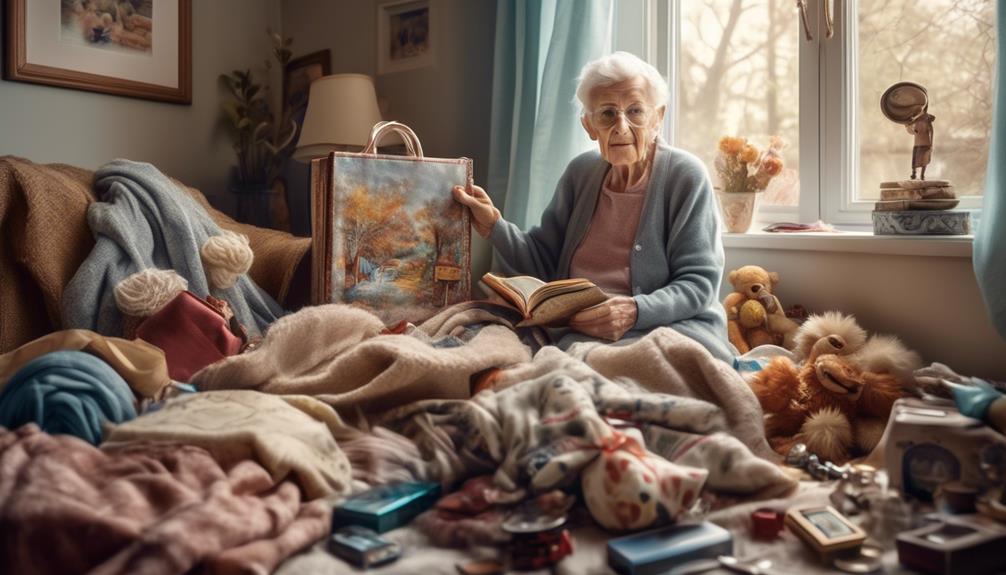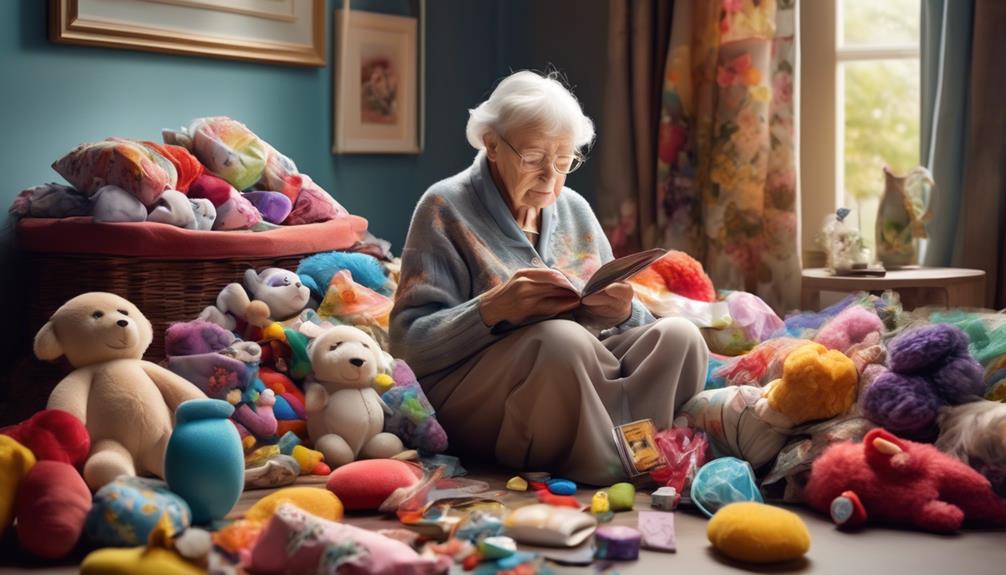Picture a ship sailing through rough waters, with each wave posing a threat to its stability. Now, envision a lifeline being thrown to the ship, offering a sense of security and solace in the midst of the turmoil.
That lifeline, in the context of dementia care, could be likened to rummage bags. In the middle to late stages of dementia, when stress and anxiety can be overwhelming, these bags filled with familiar items offer a sense of security and familiarity.
But how exactly do these seemingly simple bags hold such transformative power in the realm of dementia care? Let's explore the nuanced ways in which rummage bags can provide solace and support to individuals navigating the complexities of dementia.
Key Takeaways
- Rummage bags provide sensory stimulation and comfort for individuals with dementia.
- Personalized sensory stimulation techniques can enhance well-being and connection.
- Cognitive engagement strategies with rummage bags stimulate memories and reduce stress.
- Familiar items in rummage bags evoke positive memories and enhance emotional well-being.
Benefits of Rummage Bags in Dementia Care
Individually curated rummage bags provide invaluable benefits in dementia care, offering essential sensory stimulation and comfort for individuals in advanced stages of the condition. In the later stages of dementia, individuals often experience heightened restlessness and agitation. Rummage bags can help alleviate these feelings by providing engaging activities and tactile objects for exploration. This sensory stimulation not only reduces stress and anxiety but also promotes cognitive function and memory recall.
For a loved one with dementia, these rummage bags offer a sense of familiarity and security, making their environment less stressful. The items in the bag act as therapeutic distractions, allowing individuals with Alzheimer's or dementia to focus their attention and engage in meaningful ways. The autonomy and independence encouraged through rummage bags empower individuals to make choices and explore at their own pace, fostering a sense of control and accomplishment.
Personalized Sensory Stimulation Techniques

Utilizing personalized sensory stimulation techniques is instrumental in enhancing the well-being and comfort of individuals with dementia. People with dementia often experience difficulties in communication and comprehension as the condition progresses through its various stages, impacting their quality of life and causing stress and anxiety for both the individuals and their loved ones.
By incorporating sensory activities tailored to the specific preferences and abilities of the person with dementia, we can provide them with meaningful interactions and a sense of connection to their surroundings.
Engaging individuals with dementia in sensory experiences like listening to calming music, reminiscing through old photos, or participating in creative activities can serve as effective coping mechanisms. These personalized techniques not only offer moments of joy and comfort but also stimulate cognitive functions and emotional well-being.
Observing and evaluating the individual's responses to different sensory stimuli is crucial in determining the most beneficial techniques for them. Through these personalized sensory stimulation methods, we can help individuals with dementia navigate their journey with greater ease and dignity.
Cognitive Engagement Strategies With Rummage Bags
Caring for individuals in middle to late stages of dementia involves implementing cognitive engagement strategies utilizing rummage bags, which serve as effective tools for stimulating memories and promoting well-being.
As dementia progresses, finding ways to engage someone with dementia becomes increasingly important. Rummage bags can be tailored to the individual's preferences and interests, containing familiar objects that spark memories and provide comfort.
Caregivers of people in later stages of dementia can use rummage bags to reduce stress and anxiety while improving overall well-being. These bags offer a personalized approach to cognitive stimulation, helping maintain cognitive function and a sense of purpose.
Regular interaction with rummage bags can provide a sense of accomplishment and joy for dementia patients. By incorporating cognitive engagement strategies like rummage bags into caregiving routines, caregivers can create meaningful and enriching experiences for individuals with dementia, promoting both mental and emotional well-being.
Emotional Support Through Familiar Items

Familiar items act as emotional anchors, providing comfort and reducing stress for individuals with dementia. When supporting older adults through dementia, incorporating familiar items can significantly impact their emotional well-being. Here's how familiar items can offer emotional support:
- Evoke Positive Memories: Personal belongings and mementos from the past can trigger positive emotions and memories, creating a sense of comfort and security.
- Stimulate Cognitive Function: Objects with sensory features like texture or scent can engage the senses, stimulating cognitive function and promoting relaxation in individuals with dementia.
- Encourage Social Interaction: Familiar items can serve as conversation starters, helping family members and caregivers connect with individuals with dementia on a deeper level.
- Enhance Emotional Well-being: Creating rummage bags tailored to individual preferences, filled with items like stuffed animals or meaningful trinkets, can enhance emotional support and reduce anxiety for those living with dementia.
Enhancing Quality of Life With Rummage Bags
Enhancing the quality of life for individuals with dementia can be achieved through the thoughtful curation of rummage bags tailored to their preferences and needs. These personalized rummage bags serve as a vital source of comfort, distraction, and engagement for people in the middle to late stages of dementia.
By incorporating familiar objects and textures, such as costume jewelry or items related to past hobbies, these bags have the power to bring back cherished memories and evoke calming sensations, ultimately reducing anxiety.
In settings like day care or assisted living facilities, where individuals may feel disoriented or restless, rummage bags offer a familiar touchpoint within their daily routine. They provide sensory stimulation, cognitive engagement, and opportunities for reminiscence, which can significantly enhance their overall well-being.
Caregivers and family members also benefit from the respite that rummage bags provide, as they witness their loved ones finding moments of peace and connection. Through these personalized interventions, we can foster meaningful interactions, improve mood, and promote moments of joy, all through the simple act of eye contact and a well-curated rummage bag.
Frequently Asked Questions
What Helps Anxiety in Dementia?
When dealing with anxiety in dementia, various approaches can be beneficial. Simple sensory activities, physical exercises, creative pursuits, and social engagements can all play a role in alleviating stress.
These activities can evoke positive memories, stimulate the imagination, and foster social connections, ultimately reducing feelings of isolation. Personalized interventions tailored to the individual's interests and preferences can have a significant impact on promoting relaxation and well-being.
What Is Rummaging in Dementia?
Rummaging in dementia is a common behavior where individuals search through belongings without intent. It often stems from boredom, anxiety, or a need for familiarity. Understanding and managing it with patience is vital.
Caregivers can help by providing redirection. Creating a safe environment is key. Rummage bags, filled with familiar items, can offer comfort and engagement. They serve as a tool to reduce rummaging behavior and alleviate stress and anxiety in individuals with dementia.
What Are 3 Things to Never Do With Your Loved One With Dementia?
When caring for a loved one with dementia, we must remember three crucial things to never do:
- argue or correct them,
- use physical force, or
- rush them.
These actions can lead to frustration, agitation, and increased stress and anxiety for our loved ones.
Instead, we should approach them with patience, understanding, and compassion to create a calm and supportive environment for both them and ourselves.
What Stage of Dementia Is Anxiety?
Anxiety in dementia commonly appears during middle to late stages, manifesting as restlessness, agitation, or repetitive behaviors. This stage can be triggered by confusion, environmental changes, or communication difficulties.
Addressing anxiety involves creating a calm space, offering reassurance, and employing relaxation methods. While medication may be an option, non-pharmacological approaches are preferred.
Understanding the stage of dementia when anxiety arises is crucial for effective management and care.
Conclusion
In conclusion, rummage bags are like treasure chests of comfort and familiarity for individuals in the middle to late stages of dementia. They provide a sense of security, cognitive stimulation, and emotional support through personalized items that evoke memories and feelings.
By incorporating rummage bags into dementia care, we can enhance the quality of life for those living with this condition. Offering moments of connection and joy amidst the challenges they face.









